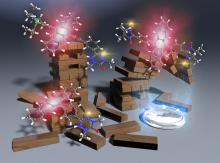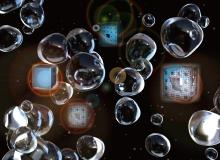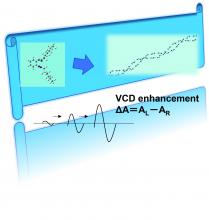Physical Chemistry Chemical Physics
News
17 Jun 2022
A research group led by Professor Yoshio Teki of the Osaka Metropolitan University Graduate School of Engineering has succeeded in developing a new pentacene derivative that is more than 100 times more photostable than TIPS-pentacene, a photostable pentacene derivative. Additionally, the team has further clarified the ultrafast excited state dynamics in this system. In the pentacene moiety of this system, we were able to demonstrate that the transition from the excited singlet state to the excited triplet state occurs ultrafast in the time region of a 10-13 seconds. In purely organic materials without heavy atoms such as rare metals, such intersystem crossing usually occurs on time scales longer than 10-9 seconds. The empirical results of this study are expected to be applied as a method for stabilizing and developing light-unstable materials in the future.
27 Feb 2022
With the aid of mathematics, materials chemistry enables dimension travel, unveiling that all properties of materials are governed by their dimension.
02 Sep 2021
Researchers have developed a general quantum algorithm that can directly calculate the energy difference of an atom and molecule using a quantum computer. By avoiding the need to calculate the total molecular energies, the general algorithm is expected to be applied not only to quantum chemical calculations but also to various physical and mathematical problems, which are intractable with nowadays classical computers.
25 Sep 2020
Researchers at Osaka City University create a quantum algorithm that removes spin contaminants while making chemical calculations on quantum computers. This allows for predictions of electronic and molecular behavior with degrees of precision not achievable with classical computers and paves the way for practical quantum computers to become a reality.
29 May 2020
(1) The development of solid state and time-step VCD methods opened a new horizon to reveal the mechanism of chirality amplification from microscopic to supramolecular scales.
(2) The authors were selected as PCCP Emerging Investigators of the Royal Society of Chemistry.
Events
Sorry, no events coming up for this topic.
Researchers
Sorry, no researchers coming up for this topic.
Giants in history
Sorry, no researchers coming up for this topic.






